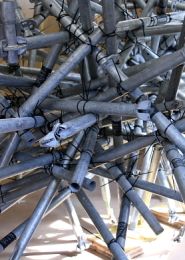What projects are you currently working on?
I am currently lead artist for Place, Space and Identity 3 – a major public art project in Stoke-on-Trent. It involves six artists responding to locations around Stoke-on-Trent with events culminating in September. I’m awaiting funding news for a project in Battersea in October, and I’m also in the group show ‘Home’ at Core Gallery, Deptford – also in October.
What do you think is the biggest challenge facing visual artists in the current climate?
Public apathy in the face of arts funding cuts.
Is there a large gap between public perception and the reality of being an artist?
In my own experience the public perception of art and artists varies wildly. I am concerned about how the public’s perception of artists is influenced by the tiny minority of celebrity artists and the stereotypes that exist about how artists work and behave. Often art is perceived as being difficult or ‘not for you’. I’ve seen people physically recoil when you tell them that something is art. There seems to be a fear that you won’t understand it, or there is prejudice against something which you thoroughly believe you don’t need – that art is a waste of money. We need to challenge this.
Are labels such as ‘amateur’ and ‘professional’ defined by how much money you make from your artwork?
If we’re being very literal, yes. A professional is someone who earns their living from the particular thing they do and has a particular level of skill. An amateur does it just for the pleasure and perhaps has undeveloped skills or a lack of experience.
As far as being an artist is concerned I think these terms are only half-relevant. I’m more interested in actual intention and quality of work. A common question asked by people when they learn that you are an artist is ‘do you make a living from that?’ as if this somehow validates what you do. Art does not have to make money in order for it to be important. I don’t see anything wrong with having another job to fund your practice, as long as when you are working on your art you are doing it in a professional manner.
I’ve reached a contradictory point in how I approach my own practice. On one hand I don’t feel that monetary value reflects artistic value. On the other, I want to make a living from my work – so I suppose I want to be a professional amateur.
Is it ok to work for free?
Sometimes. You have to have a good reason. Doing exhibitions, talks and other projects for free is often part of networking – of building relationships which further down the line can be rewarding. These need to be chosen very carefully. What needs to be stopped is the exploitation of artists – get rid of the ‘having to pay your dues’ attitude and encourage galleries to pay even a token fee. We currently seem to have a system that perpetuates the idea that it is OK in many cases not to pay artists (which has the effect of making artists think it is OK not to be paid). Again, we need to change this.
What can artists do to enhance their working lives and professional status?
Trying to stop working for free is a good step toward professionalising your practice. I really feel that this is an important move towards creating the perception of the artist as a serious and necessary element of society. If we don’t take ourselves seriously then how can we expect others to do so? (Of course by ‘serious’ I mean a professional seriousness – don’t stop having fun, making humourous and satirical work or taking risks.)
How important is it that artists support one another?
Very. We need all the support we can get at the moment.
Links
Visit www.counterwork.co.uk for further details on Rich’s projects and writing.
More information on Place Space Identity 3 can be found here
Watch video of Rich discussing his practice at the June AIR Salon
a-n.co.uk August 2011


